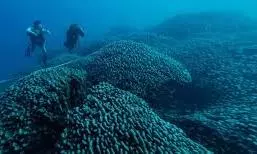
World’s largest coral discovered in Solomon Islands
text_fieldsScientists have uncovered what is believed to be the largest coral ever recorded, located in the Solomon Islands.
Spanning approximately 111 feet wide and 104 feet long, this extraordinary coral is comparable in size to two basketball courts and is visible even from space.
The discovery, made by National Geographic’s Pristine Seas expedition team in October, underscores the untapped richness of marine ecosystems and the need for their preservation.
Dr. Molly Timmers, the lead scientist of the expedition, described the coral as resembling “a shipwreck” when viewed from the surface. Divers exploring the site revealed its vast expanse and vibrant colors, which ranged from brown and yellow to shades of blue. Estimated to be between 300 and 500 years old, this coral surpasses the previous record-holder, “Big Momma,” located in American Samoa.
Dr. Enric Sala, founder of the Pristine Seas initiative, likened the discovery to identifying “the world’s tallest tree,” emphasizing the coral’s ecological significance. Coral reef researcher Dr. David M. Baker of the University of Hong Kong, while not directly involved in the study, highlighted that such large structures symbolize resilience, having endured centuries of environmental challenges.
Despite its seemingly robust state, the coral faces significant risks. Local threats such as overfishing disrupt the delicate balance of reef ecosystems, while global challenges like climate change loom large. Warmer ocean temperatures heighten the risk of coral bleaching, a phenomenon that can lead to widespread coral mortality.
The Solomon Islands, home to over 490 species of hard and soft corals, represent one of the most diverse coral ecosystems globally. This latest discovery sheds light on the hidden wonders beneath the ocean’s surface and serves as a poignant reminder of the urgent need for conservation efforts in the face of environmental change.























